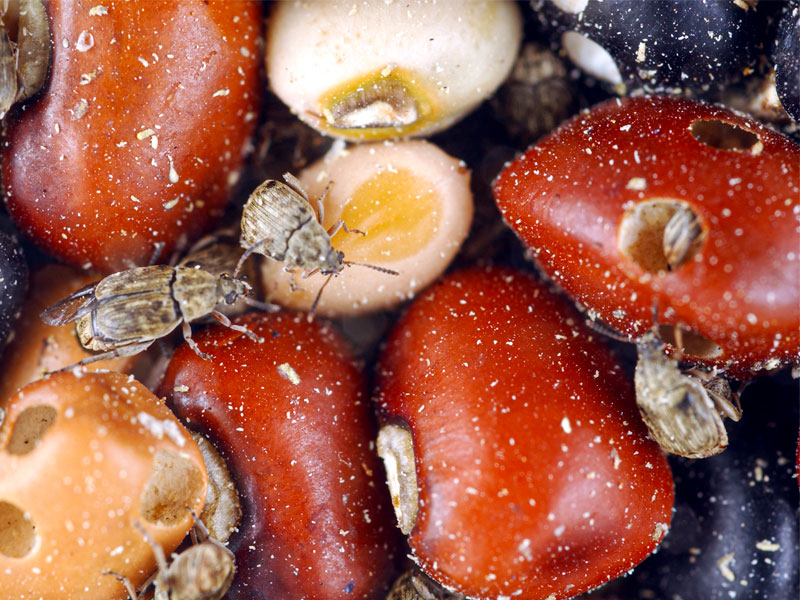Stored product insects

The stored product insects (SPI) or the ‘pantry pests’ infest products such as cereals (rice, flour, cookies, spaghetti, cornmeal and oatmeal, etc..), chocolate, milk powder, cured meats, cheese, dried foods and nuts, seeds and bird seeds, tea, pet food and others. They create more damage to the product they infest than they consume. Due to the wide variety of products they feed on, usually almost all products stored at home or in food factories are susceptible to stored product insect infestation. These pests do not cause any harm to people or pets in domestic premises. They only infest the products, where they have their food source and create damage larger than the size of what they consume from the infested products. Nowadays, there are many potential products that we keep in our households that might become infested by the ‘pantry pests’ – cereals, chocolate, cake mixes, flour, corn, nuts, seeds, pet food, rodent baits, etc..
There are different ways of getting a stored product insect infestation:
- the products have come infested from the warehouse
- the products have been left unused on the shelf for too long (however even new products can become infested if the insects are already present)
- pests from stored grains are usually also stored product insects, which are easy to find outdoors
When it comes to domestic prevention of stored product infestation, a good practice always is to keep your property clean and tidy. Products susceptible to infestation by stored product insects should not be left unused for too long. Disposal of the infested products would significantly reduce the infestation. When checking for the pests, one should look under cans and around other products as well as some beetles hide there too. Thorough hoovering is recommended after the disposal of the infested products, including the spillages of the products when cleaning up. All shelves, cracks and crevices should be thoroughly hoovered. The contents of the hoover should then be sealed and binned.
Sanitisation is also an important aspect when it comes to eradicating or preventing a stored product infestation. Sanitising after cleaning the infestation is essential, as well as keeping the products stored in secure packaging, which would help to prevent re-occurrence of the infestation. For best results you may consider placing products kept originally in plastic, cardboard and paper packaging in glass jars, which can be tightly closed. Also, purchasing smaller amounts of products would help you to reduce the time a product is kept on your shelves. In case that you already have products stored in bulk, then a thorough inspection is recommended to ensure that there is no infestation present there. Regular checks are recommended for such bulk products.
SPI control

When it comes to the treatment of the stored product pests, Prime Pest Control offer our customers different options, which depend on the customers’ budget and preference. The first option is to have a fumigation done, which requires the customers to leave the property or the industrial plant for up to 24 hours after the treatment and uses an insecticide in the eradication process. Fumigation is an effective method, which tackles the SPI, even in very difficult to reach spaces. It exterminates all stages of the pest, including its eggs. Surface or ultra low volume (ULV) spray with insecticides designed for food storage at industrial sites is another professional approach.
Another option that we can offer our customers is the heat treatment with hot air. It produces temperatures up to 65 Celsius and is non-toxic. It is also a treatment that is efficient for the extermination of various other pests such as bed bugs, moths, mites, midges, ants, etc… The heat treatment requires a short preparation, which our team will guide you through and you can return to your property on the same day after the treatment is completed. Similarly to the fumigation, the heat treatment eradicates all life stages of the pests, including their eggs, larvae and pupae.
Stored product insects are popular within many households and businesses in the food industry. There are different ways that an infestation is being introduced. Sometimes they are brought to premises with an infested batch of raw materials or foodstuffs. In other cases the stored product insects are actually already present widely outdoors and they are brought inside the domestic property, the industrial plant or food storage warehouse.
Our team of professionally trained pest technicians by the British pest Control Association (BPCA) have years of experience tackling stored product insects infestations in London and the surrounding counties. If you encounter a stored product infestation at your property or business premises and you are not sure how to tackle the problem, at Prime Pest Control we create tailored pest management schemes, which are suited individually to our customer’s needs and requirements. You can call our pest control specialists for free stored product insects advice on our company numbers, where you can also book your appointment for inspection and have a bespoke pest management plan made with your needs and interest in mind.
About SPI
Stored product insects is a general name for various kinds of beetles, moths, weevils, and a mite. They can cause significant problems to your home supplies, business and produce. Not only do they infest those and make them unfit for use but if they are not dealt with timely, they can contaminate the ready-made products and put your name and business in an unfavourable situation. Having a regularly set-up pest control schedule would help you prevent a stored product insect infestation. In the long term it can save you money and keep your, home or business, name and reputation clear.
The stored product insects are often causing troubles to businesses but they are also one of the most common domestic pest problems. They infest goods such as grains, flour, cheese, chocolate, dried foods, nuts, etc.. The ‘pantry pests’ are usually noticed when they crawl or fly out and spread around the property. They do not cause damage to the property, people or pets, and can be spotted grouped together in pots, dishes, inside cupboards or around the edges of the windows.
